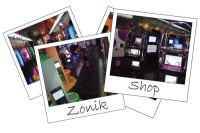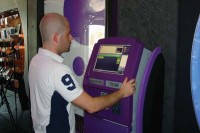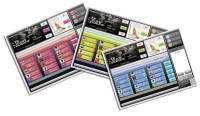 Since 2002 Eagle Eye Technology, the UK-based mobile and interactive technology consultancy, has been providing creative thinking and robust, scalable solutions that enable retailers and other organisations to engage with consumers through their mobile devices.
Since 2002 Eagle Eye Technology, the UK-based mobile and interactive technology consultancy, has been providing creative thinking and robust, scalable solutions that enable retailers and other organisations to engage with consumers through their mobile devices.
In 2007 Eagle Eye Technology also entered the interactive technology space providing solutions for in store kiosks, and recently created Eagle Eye Technology’s Global Kiosk, a state of the art digital content kiosk solution. The Global Kiosk solution allows Eagle Eye Technology to take digital content feeds 24/7 from content suppliers worldwide, and distribute it through a network of in-store kiosks allowing customers to browse, purchase and download thousands of legal digital albums and singles, music videos and movies to portable media players or memory devices. Eagle Eye Technology continues to further develop its forward thinking in mobile and interactive technology. Ed Pippin, Director, Eagle Eye Technology, spoke to The Grocery Trader.
The Grocery Trader – First of all, Ed, who are the team behind Eagle Eye Technology? Where are you based?
Eagle Eye Technology is a close-knit team with a huge amount of experience building both large and small-scale customer facing and B2B solutions for clients. Our employees are experts in their fields and are regularly asked to speak at conferences about their work and thoughts on how the technology and customer interaction with technology will change in the future. We are based in Guildford.
GT – What is your role in the business? How do you develop your technology?
I am the Managing Director of the company. I cover all aspects of the company, from keeping an eye on Finance to ensuring all projects are running smoothly and delivered to time and budget. I also work with the rest of the board to ensure we have a solid direction in the next six months, year, five years and beyond.
Our solutions are developed through sitting down with the client and working out what they need from their system. We take these requirements back to a development team who review and suggest potential changes and improvements to the deliverable. We are always looking at new technology to see how we can improve our offerings.
GT – How big is Eagle Eye Technology in turnover?
Eagle Eye Technology has around £1.5m turnover, with annual growth of around 20%. We work with companies with customers or employees in almost every country in the world.
GT – How do you summarise what you do?
We were originally established to make it easier for public and private organisations to interact with their customers through use of mobile technologies. As we have grown we have realised that mobile is only one of many interactive technologies available to companies. Whilst some technologies, like mobile, are now becoming mainstream others are very powerful but currently niche by comparison. The key is to help match our customers with the interactive technology that meets their needs and that of their customers. The key areas we cover are mobile services, software services including our kiosk services and consultancy.
GT – What do your mobile services include?
 Our mobile services include our suite of systems that are accessed via the internet, which allow our customers to send text messages from their systems (MessageCentre) and run text competitions, text voting and comment service (DakotaSMS). We also have a mobile Internet render engine platform that reformats content so it will display on the thousands of different browsers and screen sizes that exist for mobile phones. This system is used by Teletext to run their mobile web site. We also have a ‘find my nearest’ mobile solution and a mobile voucher platform.
Our mobile services include our suite of systems that are accessed via the internet, which allow our customers to send text messages from their systems (MessageCentre) and run text competitions, text voting and comment service (DakotaSMS). We also have a mobile Internet render engine platform that reformats content so it will display on the thousands of different browsers and screen sizes that exist for mobile phones. This system is used by Teletext to run their mobile web site. We also have a ‘find my nearest’ mobile solution and a mobile voucher platform.
We enable companies all over the world to engage with their customers through mobile communication. These mobile services can be chosen off the shelf or tailored. Our MessageCentre platform delivers over a million text messages a month.
GT – Which UK companies are your customers for mobile services? What sort of things are they using mobile services to do?
We work with all manner of companies in the world of Mobile Services including Teletext, MasterCard, Serco Docklands, 888.com and Clear Channel. These companies use mobile services to both add value to their existing services and create new revenue streams and new ways of communicating with their customers.
The biggest growth we have seen recently is companies using text messages to keep their customers informed of special offers and events. As long as people can easily opt out, you very quickly get a core group of customers who value the messages and interact with you via SMS, thus benefiting both parties and building very strong brand relationships.
GT – Can you name any UK supermarkets or other retailers who use your mobile services?
Woolworths was our biggest high street client. They were using all manner of mobile services, from Location Services, whereby we can locate a customer’s phone and tell them their nearest shop, to SMS competitions, used in ad campaigns and on the back of special offer leaflets in store, to earning revenue from selling mobile content -ringtones, wallpapers and mobile game download – through their web site and in-store kiosks.
GT – How do UK retailers compare with retailers elsewhere in their adoption of mobile communications to reach customers? To what extent do UK supermarkets understand the potential marketing benefits of mobile technologies like yours?
I for one have yet to receive a text from any supermarkets I shop at, but I regularly receive Orange Wednesday reminders to my phone and regularly use them.
I’m sure the supermarkets understand that mobile communications are a very important part of any marketing strategy.
The key is using it most effectively, which comes from knowing your customers and knowing the advantages, attitudes to and intricacies of using mobile as a marketing channel, and this is where we can add value.
GT – Everyone’s got loyalty cards, but do you think UK consumers are ready to get promotional texts from their supermarket?
 Absolutely. Mobile Vouchers have been in the marketplace for many years now, but take up by retailers has been slow.
Absolutely. Mobile Vouchers have been in the marketplace for many years now, but take up by retailers has been slow.
We operate the world’s leading mobile voucher services for Eagle Eye Technology Solutions. High street retailers use these services to deliver mobile coupons and mobile promotions direct to the consumer, delivering exceptionally high and trackable Return on Investment. This service has already chalked up a number of world firsts, including the first mobile gift voucher in national retail, first mobile drink gifting service and first mobile promotions where real value is delivered to the consumer. This service has the patent granted in the UK, making it the only service that can utilise the Chip n Pin payment infrastructure in the UK and soon in significant other territories around the globe. Truly a world beater of a service.
Mobile Vouchers also allow much more data to be collected on the entire voucher process, from where the advert detailing the voucher was seen to when, where and who redeemed the voucher. We have achieved over 20 times ROI for retailers using the mobile coupons and have seen up to 10 times more revenue generated through this mechanic than other traditional Direct Mail type services.
GT – On the consultancy side, how do you go about helping companies to use the mobile channel more effectively?
We understand our business and our customers understand theirs. We work with them and use our experience to help them use the mobile channel more efficiently. Also, the cost barriers to mobile are very low, allowing companies to ‘test the water’ with smaller mobile campaigns. As time passes, we find they slowly scale the marketing up as they start seeing how well it works for them.
GT – What is your view about the mobile channel’s marketing potential?
 We believe mobile is more than an optional extra – it is a powerful and unparalleled opportunity to interact with clients, customers, suppliers and employees and there’s never been a better time to benefit from it. As an independent organisation, with extensive experience in the mobile arena, Eagle Eye Technology is uniquely placed to advise on the quick wins and long term strategies that will enable a retail business to flourish in mobile.
We believe mobile is more than an optional extra – it is a powerful and unparalleled opportunity to interact with clients, customers, suppliers and employees and there’s never been a better time to benefit from it. As an independent organisation, with extensive experience in the mobile arena, Eagle Eye Technology is uniquely placed to advise on the quick wins and long term strategies that will enable a retail business to flourish in mobile.
GT – Moving on to interactive technology, your first digital downloading kiosks were in UK high street Woolworths stores. What were they like?
The first generation of kiosk solutions we produced were by request very basic in functionality, and we really cut our teeth on the customer experience from these kiosks. These kiosks were like web sites in store. They allowed customers to browse typical mobile related content, wallpapers, ringtones and games. Customers would either then text in or receive a text from the kiosk telling them how to download the content onto their phone. They were also billed on their phone, using reverse bill text messaging.
GT – Your latest high-profile kiosk project is developing and managing a complicated distribution network of kiosks in Saudi Arabia. How far has that got?
This kiosk project was a huge leap forward in terms of technology used and sheer size from our first generation kiosks. With the kiosks for Saudi Arabia the content stores are huge, containing tens of thousands of music tracks, albums and movies from dozens of different content suppliers. The challenge was substantial, to allow content suppliers to automatically feed their content into our systems and for us to distribute that content in a safe and secure way to the end kiosk and allow the customer the best possible experience at the kiosk, meaning a great look and feel and fast browsing and download times.
We are currently in the middle of the second phase of rollout, which will see us putting a further 200 kiosks around Saudi Arabia, into multiple retailers, with each retailer having a different user facing front end. By January we will have over 300 kiosks in the public domain with many more planned for 2011, including moving into neighbouring countries.
GT – What advances in technology have you built into the current generation of kiosks?
The current generation of Eagle Eye Technology’s Global Kiosks support the copying of DRMd and non DRMd content onto MP3 devices, Bluetooth Devices, Plays For sure Devices, USB sticks and Memory cards and even burning music CDs in store.
The kiosks also have advertising placeholders throughout to provide ‘in kiosk advertising,’ and also allow customers to listen to tracks and view trailers on the kiosk, before they buy. Even in quiet periods the kiosk is utilised with video screen saver support to allow it to act as a video advertising screen when not in use.
Behind the scenes, the kiosk system is now incredibly scalable and completely content supplier independent, which means we can integrate into large US suppliers and more home grown independent labels.
GT – What lessons have you learnt supplying this solution in Saudi Arabia?
They key areas seem obvious, but meant the system had to be very configurable. The new generation is multi-lingual, so users can choose which language to browse the kiosk in. Advertising, content on sale and album covers and movie posters displayed on the kiosk can also be controlled centrally so inappropriate content can easily be removed from certain stores and geographical areas.
Saudi Arabia is a big country and there can be huge distances between towns and therefore between kiosks. More central configuration of the kiosks, as well as content, which was already centrally controlled, was a big leap forward with the new generation kiosks. It means we do all manner of clever things, including changing the look and feel of a kiosk remotely without having to send a technician out to make software changes.
GT – Are you planning to roll out Eagle Eye Technology’s Global Kiosks here in the UK? Which retailers have agreed to take it?
 Currently we are still looking for our first retailer to take this on in the UK. We believe the market is right, with digital downloads growing on a daily basis, and the costs are right for retailers to take this on board now.
Currently we are still looking for our first retailer to take this on in the UK. We believe the market is right, with digital downloads growing on a daily basis, and the costs are right for retailers to take this on board now.
GT – The UK has pretty high levels of broadband access, with people downloading movies and music to computers. Are you involved in that business in some way?
We are currently working with one of the main US movie distributors to create a customer facing movie download site that people access from their computers. Currently this market is more mature than that for digital content kiosks downloads, however movie downloads are still comparatively rare, even though the demand is there: just look at the numbers using the BBC iPlayer.
GT – How big is the potential market here for kiosk-based digital content downloads? What proportion of music sales are digital downloads as opposed to bought in physical form? Do people use kiosks to buy singles and albums?
The potential market here for kiosk-based digital content downloads dwarfs physical sales, but there will always be a market for both. I saw on the Guardian Online recently that UK digital singles sales in 2008 were up 41.5% – to 110.3m units – while physical singles sales were down 43.5% to just 4.6m. Now most of these will have been online, but the demand for the product is clearly there. Now more than ever customers will only spend their money on exactly what they want, and allowing them to choose the format of their product is very important.
In September 2009, HMV bought a 50% stake in online music retailer 7digital to help sure up its distribution path for digital content. Digital content is no longer just a sideline, it must be fully utilised to ensure maximum returns.
In our experience, customers are marginally more likely to buy albums or movies on kiosks than singles. Maybe people want to buy something more substantial than a single if they are in a shop, whereas at home the purchase can be a little bit more spontaneous, so it doesn’t have to be big.
GT – What hardware do your solutions run on?
Our applications can run on any standard technology. Our modular framework is technology agnostic, allowing databases or third party service providers to be swapped in or out with minimal impact.
We understand that some customers want to bring everything in house, and that means hardware has to fall into their area of support knowledge. We also understand that some customers want it to be the most advanced system on the market, but want to use their relationships with existing suppliers to get the equipment, and we can work with that too.
GT – What are the steps in developing a mobile or other solution for a retailer?
The first step is actually the trickiest, and that is working out the actual business requirements. Companies may have end goals in mind but not necessarily know how to get there, or may have seen something that works and want to move into that area. Our job at this stage is to work with the client to work out how we get from here to where they want to be.
Once everyone has a firm idea of what they want the system to do, we document it, agree it and build it. We then work with the client to fine-tune the deliverable and keep them up to date with progress with regular conference calls and build/configuration releases, until finally we deliver the solution that helps meet the goals they wanted to achieve.
GT – What effect has the recession had on your business?
The biggest noticeable effect was the collapse of Woolworths and EUK at the end of last year. I was very proud of the fact that our business streams were strong enough to weather that particular storm.
The less obvious effect is that companies are more cautious about new technology and rightly so. For me, the recession is showing that whilst the public are more cautious with their spending they are now, more than ever, looking for the right product at the right price. If you can use mobile marketing to put that product under their nose then they will buy it, and if the right product is a movie that they can keep on their MP4 player and watch on the train or have on the xBox in the lounge, then they will buy it.
GT – What other exciting new technologies can we look forward to from Eagle Eye Technology?
We are very excited about the move towards mass-market acceptance of NFC communications technologies like Oyster. We are currently working on projects to bring products to market that take advantage of this technology in ways that will change how people do all manner of things, from going to a concert to buying items in shops.
Whilst the technology is there and has been for some time, we are simply working to find markets that are ready to use the technology. With these projects that we are working on, our clients believe we have found these markets and are prepared to start moving into them.
GT – Finally, where do you see Eagle Eye Technology going from here?
Five years from now, we will still be releasing new versions of existing systems and will have new systems we haven’t even thought of yet, that will be starting to get traction in the market.
The great thing about Eagle Eye Technology is that new technologies come along all the time and we are flexible enough to incorporate them into our work. Whilst we work hard to expand and build upon existing systems, to ensure we get the maximum benefit from all the development time put into our products, we also move rapidly to take advantage of any opportunities that come our way.
The future will see new customer trends and desires, and we will still be there to help public and private organisations to interact with their customers through the use of the latest interactive technologies.
Eagle Eye Technology tel: 01483 549848 www.eagleeyetechnology.com




Comments are closed.